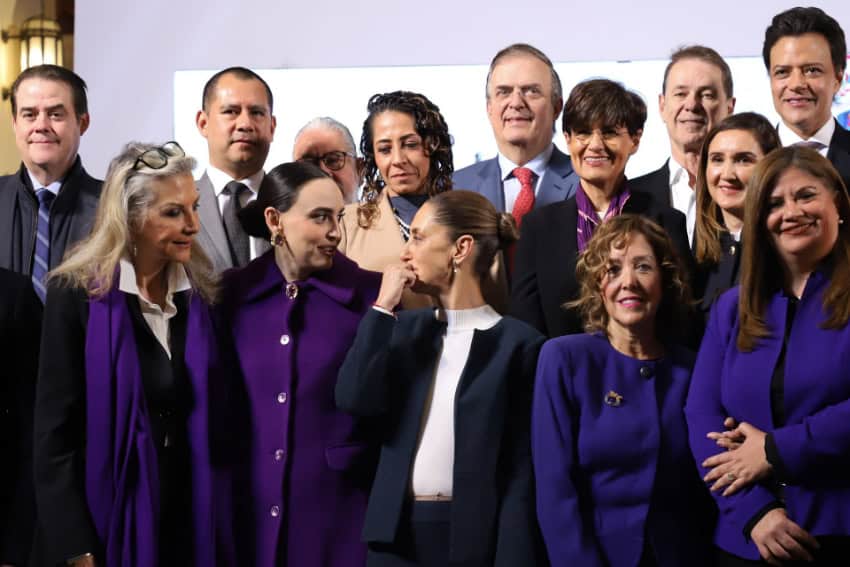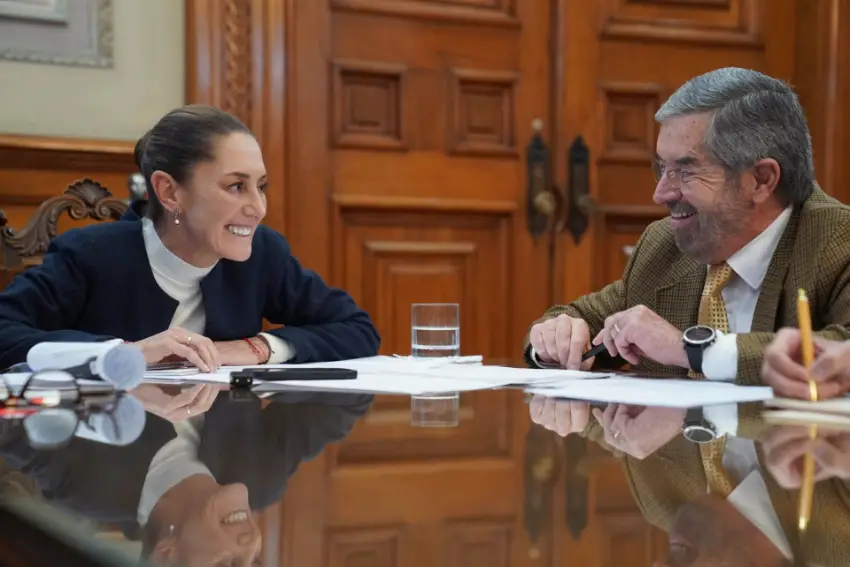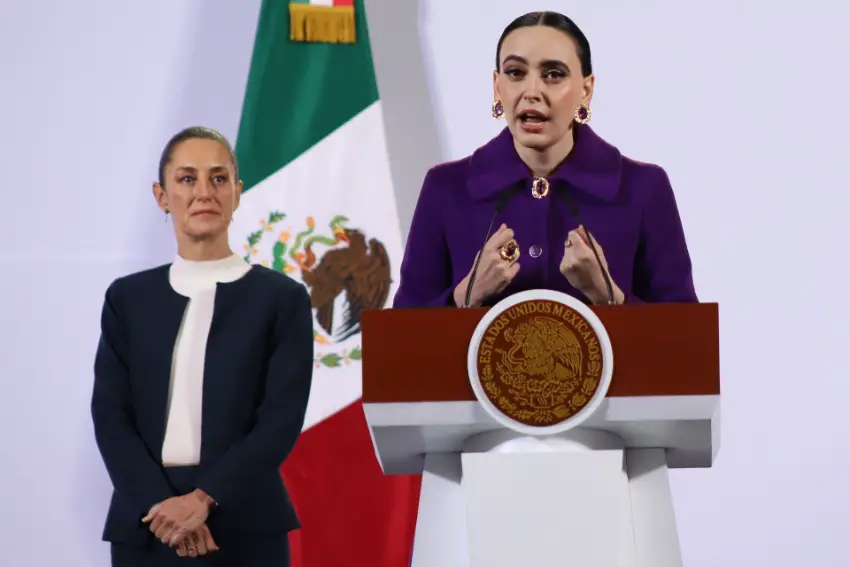Amid tariff threats, Mexico looks to develop: the mañanera recap

Donald Trump’s latest tariff threat was the dominant issue at President Claudia Sheinbaum’s Wednesday morning press conference.
Economy Minister Marcelo Ebrard spoke about the potential impact of a 25% tariff on Mexico’s exports to the United States (read Mexico News Daily’s report here) and Sheinbaum fielded several questions on the incoming U.S. president’s plan to tax goods sent north from Mexico.

A group of CEOs and business group leaders also attended the president’s mañanera to witness the signing of a document to formally create the government’s Advisory Council for Regional Economic Development and Relocation.
New council is a public-private initiative
Sheinbaum said that the government’s Advisory Council for Regional Economic Development and Relocation is a collaboration with the Business Coordinating Council and “other private sector chambers.”
She said that the council’s work will focus on the development of the government’s “well-being hubs” – 10 industrial corridors spanning all 32 federal entities of Mexico where 100 industrial parks are slated to be built.
Sheinbaum reminded reporters that she first presented the initiative during the campaign period leading up to the presidential election in June and noted that the plan is to build industrial corridors that focus on the “productive vocations” of the regions in which they are located.
For example, the priority sectors of a corridor running mainly along the Gulf of Mexico coast will be petrochemicals, fossil fuels, lumber, fruit production and fishing.


Sheinbaum said that the work of the new advisory council, in conjunction with government ministries, will be to support and promote the various industrial corridor projects “that form part of what we call Plan Mexico.”
“It’s a development plan for the country that represents well-being for Mexicans and sustainability – protection of the environment, in other words,” she said.
In a post to LinkedIn, the CEO of the American Chamber of Commerce of Mexico (AmCham), Pedro Casas Alatriste, announced that AmCham had been invited to join the new advisory council.
“Our mission is ambitious and clear,” he wrote before citing the following objectives.
- Attract new investment projects to Mexico.
- Foster the growth of local suppliers.
- Drive sustainability initiatives.
- Boost international academic exchanges.
- Strengthen Mexico’s development bank to increase small and medium enterprises’ participation in global trade.
“This council represents an unprecedented opportunity for the public and private sectors to unite for the country’s progress. We’ll work daily toward these objectives and report tangible results to the president every two months,” Casas said.
“… We’re aiming for nothing less than a transformational impact on Mexico’s future. Let’s get to work. This is our moonshot,” he added.
Mexican officials to speak with Trump’s team soon, Sheinbaum hopes
Sheinbaum told reporters that Foreign Affairs Minister Juan Ramón de la Fuente is “already in contact” with members of Trump’s team and suggested that Mexican officials could speak with them in the coming days to discuss the president-elect’s tariff threat and other issues.
She noted that Thanksgiving is coming up, but said that “the idea” is to “communicate” with Trump’s team “in these days.”


Beyond Trump’s pledge to impose a 25% tariff on Mexican exports on the first day of his second term as U.S. president, Sheinbaum said that the two parties would discuss migration, violence and the illegal trafficking of weapons to Mexico.
In response to a subsequent question, the president walked back her suggestion that a meeting with Trump’s team would happen soon.
The “best time” for the meeting “will be found,” she said, adding that it will “ideally” take place before Trump’s inauguration on Jan. 20.
Economy Ministry is preparing reciprocal tariffs to impose ‘if necessary’
At her Tuesday morning press conference, Sheinbaum said that U.S. tariffs on Mexican exports would be met by reciprocal tariffs on U.S. exports to Mexico.
On Wednesday, she declined to specify whether Mexican tariffs would apply across the board or target specific U.S. industries or products, only saying that the Economy Ministry was preparing duties to impose “if necessary.”
Sheinbaum once again expressed confidence that Mexico and the United States will reach an agreement to avert the imposition of a 25% blanket tariff on Mexican exports.
In 2018, Mexico imposed tariffs on U.S. products including pork, bourbon and apples in response to U.S. tariffs on Mexican steel and aluminum.
A year later, Mexico managed to avoid blanket tariffs threatened by Trump by agreeing to ramp up enforcement against migrants traveling though Mexico to the country’s northern border.
Mexico has ‘very good relations’ with China
Asked about the government’s plan to reduce Mexico’s reliance on imports from China, Sheinbaum stressed that Mexico has “very good relations’ with the east Asian nation and asserted that the government’s objective is simply to “recover” domestic manufacturing capacity that was “lost” over the years.
It’s not a matter of taking a position against China but rather adopting “a policy of national development,” she said.
“It has nothing to do with one nationality or another,” Sheinbaum said.
Mexico favors trade with countries with which it has free trade agreements, but that doesn’t mean goods can’t be imported from other nations, she said.
By Mexico News Daily chief staff writer Peter Davies ([email protected])
Source: Mexico News Daily

